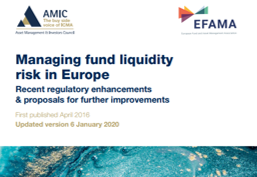Management Companies
EFAMA has been looking at legislative proposals with a direct impact on asset management companies and services, and closely follows any regulatory developments of critical importance to the sector. In addition to issues related to risk management and financial stability, high up on the agenda of EFAMA members is the framework for a prudential regime for Investment Firms (IFD/R), and related implementing measures directly descending from such framework.
EFAMA is focused on minimising the impact of the rules on asset management companies, in particular those holding a limited MiFID license. Key to the sector is the need for proportionality, especially firms that are not authorised to hold client money/securities, or to deal on their own account.
EFAMA Response to the IOSCO Consultation on CIS Liquidity Risk Management Recommendations (CR04/2017)
Use of Leverage in Investment Funds in Europe | AMIC-EFAMA Joint Paper
EFAMA response to the IOSCO Consultation on Termination of Investment Funds
EFAMA welcomes the opportunity to provide its comments on the Good Practices to be adopted by IOSCO for the Termination of Investment Funds. We agree that the decision to terminate a fund can have significant impact on investors in terms of the costs associated with such an action, or the ability for investors to redeem their holdings during the termination process. In this regard, even in the context of a fund’s voluntary termination, asset managers must abide by their fiduciary obligation to act in the best interest of their investors.
EFAMA's and ICMA’s AMIC joint response on fund liquidity management by open-ended funds to IOSCO
ICMA’s AMIC and EFAMA have submitted a joint response to the IOSCO consultation on fund liquidity management by open-ended funds.
The response highlights how industry practices and existing regulatory provisions in Europe are well aligned with the Liquidity Risk Management (LRM) recommendations issued by IOSCO in 2018 (Annex 1).
Monthly Statistics January 2021| January another strong month for UCITS equity funds
The European Fund and Asset Management Association (EFAMA) has today published its latest monthly Investment Fund Industry Fact Sheet, which provides net sales data of UCITS and AIFs for January 2021.
European Statistics Q4 2020 | 2020 Trends | Inflows into UCITS and AIFs bring European fund assets to an all-time high
The European Fund and Asset Management Association (EFAMA) has today published its Investment Fund Industry Fact Sheet for Q4 of 2020, together with an overview of the full year.
The main developments through the quarter are as follows:
Annual Review June 2019-June 2020
"It gives me great pleasure to provide you with an overview of our activities since our Annual General Meeting in Paris last year. While we were very much looking forward to hosting you all in Brussels this week, the current crisis and associated travel restrictions has forced us to improvise and turn our meeting into a virtual AGM.
Investment Funds Distributor Due Diligence Questionnaire
Funds face unique challenges in performing intermediary oversight, and especially so because of MiFID II requirements, changing regulatory landscapes, and the absence of an industry agreed-upon standard between funds and their distribution channels. To help address these challenges, a dedicated working group developed a uniform due diligence questionnaire (DDQ) that will serve as the standard for investment funds (UCITS and AIFs) in performing onboarding and ongoing oversight of distribution channels.
AMIC EFAMA Report - Managing fund liquidity risk in Europe - 2020
In 2019, AMIC and EFAMA decided to update their 2016 report “Managing Fund Liquidity Risk in Europe” following important policy and regulatory developments at EU and international levels. The purpose of this updated report is to outline the practical liquidity risk management processes which fund management companies put in place when setting up a fund and implement throughout the life of the fund. Also, the report describes the existing European and international regulatory frameworks in the area of fund liquidity risk management.

































